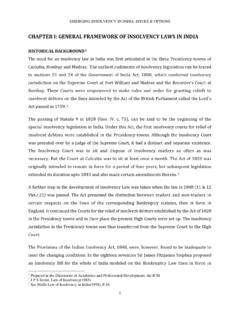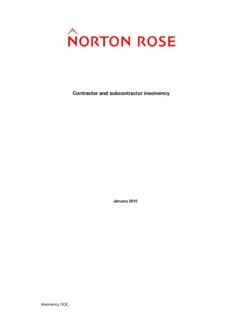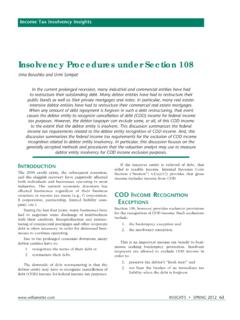Transcription of INSOLVENCY - Justice Home
1 INSOLVENCY INSOLVENCY ACT 24 OF 1936 [ASSENTED TO 17 JUNE 1936] [DATE OF COMMENCEMENT: 1 JULY 1936] (Signed by the Governor-General in Afrikaans) as amended by Finance Act 17 of 1938 Income Tax Act 31 of 1941 Hire-Purchase Act 36 of 1942 INSOLVENCY Law Amendment Act 16 of 1943 Insurance Act 27 of 1943 Merchant Shipping Act 57 of 1951 General Law Amendment Act 32 of 1952 General Law Amendment Act 62 of 1955 General Law Amendment Act 50 of 1956 Proclamation 229 of 1956 Farmers' Assistance Amendment Act 16 of 1960 Finance Act 64 of 1960 Proclamation 210 of 1960 Income Tax Act 80 of 1961 Proclamation 159 of 1961 Income Tax Amendment Act 6 of 1963 INSOLVENCY Amendment Act 99 of 1965 INSOLVENCY Amendment Act 6 of 1972 Income Tax Act 90 of 1972 General Law Amendment Act 62 of 1973 General Law Amendment Act 29 of 1974 Income Tax Act 85 of 1974 Sales Tax Act 103 of 1978 INSOLVENCY Amendment Act 78 of 1980 INSOLVENCY Amendment Act 101 of 1983 INSOLVENCY Amendment Act 84 of 1984 Transfer of Powers and Duties of the State President Act 97 of 1986 INSOLVENCY
2 Amendment Act 27 of 1987 INSOLVENCY Amendment Act 89 of 1989 INSOLVENCY Amendment Act 6 of 1991 Financial Institutions Amendment Act 54 of 1991 General Law Amendment Act 139 of 1992 Security by Means of Movable Property Act 57 of 1993 INSOLVENCY Amendment Act 122 of 1993 General Law Third Amendment Act 129 of 1993 General Law Fifth Amendment Act 157 of 1993 INSOLVENCY Amendment Act 32 of 1995 General Law Amendment Act 49 of 1996 Judicial Matters Amendment Act 104 of 1996 Judicial Matters Amendment Act 34 of 1998 Judicial Matters Second Amendment Act 122 of 1998 Cross-Border INSOLVENCY Act 42 of 2000 Administration of Estates Laws Rationalisation Act 20 of 2001 Judicial Matters Amendment Act 42 of 2001 INSOLVENCY Amendment Act 33 of 2002 INSOLVENCY Second Amendment Act 69 of 2002 Judicial Matters Amendment Act 16 of 2003 Judicial Matters Second Amendment Act 55 of 2003 Securities Services Act 36 of 2004 National Credit Act 34 of 2005 Regulations under this Act DETERMINATION OF AMOUNTS FOR THE PURPOSES OF SECTION 100 (GN R2844 in GG 14330 of 9 October 1992) Page 1 of 96 INSOLVENCY5/15/2009http://juta/ (GN R1379 in GG Extraordinary of 24 August 1962) ACT To consolidate and amend the law relating to insolvent persons and to their estates.
3 1 Repeal of laws The INSOLVENCY Act, 1916 (Act 32 of 1916), the INSOLVENCY Act, 1916, Amendment Act, 1926 (Act 29 of 1926) (except the title and preamble thereof and sections one , seventy-one , seventy-two and seventy-four thereof) and section twenty of the Land Bank Amendment Act, 1934 (Act 58 of 1934) are hereby repealed: Provided that if an estate was sequestrated or assigned before the commencement of this Act the sequestration or assignment and all proceedings in connection therewith shall be completed, and a person whose estate was sequestrated or assigned before such commencement and any matter relating to such sequestration, assignment or person shall be dealt with as if this Act had not been passed; and provided further that if, before the said commencement, any action was taken under the said Act 32 of 1916 with a view to the surrender or sequestration of an estate but the surrender or sequestration was not effected before the said commencement, such action shall, after such commencement, be deemed to have been taken under this Act, in so far as this Act makes provision therefor.
4 2 Definitions In this Act unless inconsistent with the context- 'account' , in relation to a trustee, means a liquidation account or a plan of distribution or of contribution, or any supplementary liquidation account or plan of distribution or contribution, as the case may require; 'banking institution' means a banking institution as defined in section 1 of the Banks Act, 1965 (Act 23 of 1965), and registered or provisionally registered or deemed to be registered as a banking institution in terms of section 4 of that Act, but does not include a provisionally registered banking institution which is so registered provisionally after the coming into operation of the INSOLVENCY Amendment Act, 1972; [Definition of 'banking institution' inserted by s. 1 of Act 6 of 1972.] 'building society' means a building society as defined in section 1 of the Building Societies Act, 1965 (Act 24 of 1965), and finally registered or deemed to be finally registered as a building society in terms of section 5 of that Act; [Definition of 'building society' inserted by s.]
5 1 of Act 6 of 1972.] 'Court' or 'the Court' , in relation to any matter means the provincial or local division of the Supreme Court which has jurisdiction in that matter in terms of section one hundred and forty-nine or one hundred and fifty-one , or any judge of that division; and in relation to any offence under this Act or in section eight , twenty-six , twenty-nine , thirty , thirty-one , thirty-two , paragraph (a) of subsection (3) of section thirty-four , seventy-two , seventy-three , seventy-five , seventy-six , seventy-eight or one hundred and forty-seven the expression 'Court' or 'the Court' includes a magistrate's court which has jurisdiction in regard to the offence or matter in question; 'debtor' , in connection with the sequestration of the debtor's estate, means a person or a partnership or the estate of a person or partnership which is a debtor in the usual sense of the word, except a body corporate or a company or other association of persons which may be placed in liquidation under the law relating to Companies; 'disposition' means any transfer or abandonment of rights to property and includes a sale, lease, mortgage, pledge, delivery, payment, release, compromise, donation or any contract therefor, but does not include a disposition in compliance with an order of the court; and 'dispose' has a corresponding meaning; [Definition of 'disposition' substituted by s.
6 1 of Act 27 of 1987.] Page 2 of 96 INSOLVENCY5/15/2009http://juta/ 'free residue' , in relation to an insolvent estate, means that portion of the estate which is not subject to any right of preference by reason of any special mortgage, legal hypothec, pledge or right of retention; [Definition of 'free residue' amended by s. 2 (a) of Act 16 of 1943.] ' Gazette ' .. [Definition of ' Gazette' inserted by s. 2 (b) of Act 16 of 1943 and deleted by s. 1 of Act 49 of 1996.] 'good faith' , in relation to the disposition of property, means the absence of any intention to prejudice creditors in obtaining payment of their claims or to prefer one creditor above another; 'immovable property' means land and every right or interest in land or minerals which is registrable in any office in the Republic intended for the registration of title to land or the right to mine; 'insolvent' when used as a noun, means a debtor whose estate is under sequestration and includes such a debtor before the sequestration of his estate, according to the context; 'insolvent estate' means an estate under sequestration; 'magistrate' includes an additional magistrate and an assistant magistrate; 'Master' in relation to any matter, means the Master of the Supreme Court within whose area of jurisdiction that matter is to be dealt with and includes an Assistant Master.
7 'messenger' means a messenger of a magistrate's court and includes a deputy-messenger; 'Minister' means the Cabinet member responsible for the administration of Justice ; [Definition of 'Minister' inserted by s. 1 of Act 16 of 2003.] 'movable property' means every kind of property and every right or interest which is not immovable property; 'preference' , in relation to any claim against an insolvent estate, means the right to payment of that claim out of the assets of the estate in preference to other claims; and 'preferent' has a corresponding meaning; 'property' means movable or immovable property wherever situate within the Republic, and includes contingent interests in property other than the contingent interests of a fidei commissary heir or legatee; 'Republic' .. [Definition of 'Republic' ('Union') added by s. 2 (d) of Act 16 of 1943 and deleted by s. 1 of Act 49 of 1996.] 'security' , in relation to the claim of a creditor of an insolvent estate, means property of that estate over which the creditor has a preferent right by virtue of any special mortgage, landlord's legal hypothec, pledge or right of retention; 'sequestration order' means any order of court whereby an estate is sequestrated and includes a provisional order, when it has not been set aside; 'sheriff' includes a deputy sheriff.
8 'special mortgage' means a mortgage bond hypothecating any immovable property or a notarial mortgage bond hypothecating specially described movable property in terms of section 1 of the Security by Means of Movable Property Act, 1993 ( Act 57 of 1993 ), or such a notarial Page 3 of 96 INSOLVENCY5/15/2009http://juta/ bond registered before 7 May 1993 in terms of section 1 of the Notarial Bonds (Natal) Act, 1932 (Act 18 of 1932), but excludes any other mortgage bond hypothecating movable property; [Definition of 'special mortgage' inserted by s. 2 (c) of Act 16 of 1943 and substituted by s. 4 of Act 57 of 1993 and by s. 1 (1) of Act 157 of 1993.] 'Supreme Court' .. [Definition of 'Supreme Court' inserted by s. 2 (c) of Act 16 of 1943 and deleted by s. 1 of Act 49 of 1996.] 'the Territory' .. [Definition of 'the Territory' inserted by s. 2 (c) of Act 16 of 1943 and deleted by s. 1 of Act 49 of 1996.] 'trader' means any person who carries on any trade, business, industry or undertaking in which property is sold, or is bought, exchanged or manufactured for purpose of sale or exchange, or in which building operations of whatever nature are performed, or an object whereof is public entertainment, or who carries on the business of an hotel keeper or boarding-house keeper, or who acts as a broker or agent of any person in the sale or purchase of any property or in the letting or hiring of immovable property.
9 And any person shall be deemed to be a trader for the purpose of this Act (except for the purposes of subsection (10) of section twenty-one) unless it is proved that he is not a trader as hereinbefore defined: Provided that if any person carries on the trade, business, industry or undertaking of selling property which he produced (either personally or through any servant) by means of farming operations, the provisions of this Act relating to traders only shall not apply to him in connection with his said trade, business, industry or undertaking; 'trustee' means the trustee of an estate under sequestration, and includes a provisional trustee. 3 Petition for acceptance of surrender of estate (1) An insolvent debtor or his agent or a person entrusted with the administration of the estate of a deceased insolvent debtor or of an insolvent debtor who is incapable of managing his own affairs, may petition the court for the acceptance of the surrender of the debtor's estate for the benefit of his creditors.
10 (2) All the members of a partnership (other than partners en commandite or special partners as defined in the Special Partnerships Limited Liability Act, 1861 (Act 24 of 1861) of the Cape of Good Hope or in Law 1 of 1865 of Natal) who reside in the Republic, or their agent, may petition the court for the acceptance of the surrender of the estate of the partnership and of the estate of each such member. (3) Before accepting or declining the surrender, the court may direct the petitioner or any other person to appear and be examined before the court. 4 Notice of surrender and lodging at Master's office of statement of debtor's affairs (1) Before presenting a petition mentioned in section three the person who intends to present the petition (in this section referred to as the petitioner) shall cause to be published in the Gazette and in a newspaper circulating in the district in which the debtor resides, or, if the debtor is a trader, in the district in which his principal place of business is situate, a notice of surrender in a form corresponding substantially with Form A in the First Schedule to this Act.
















